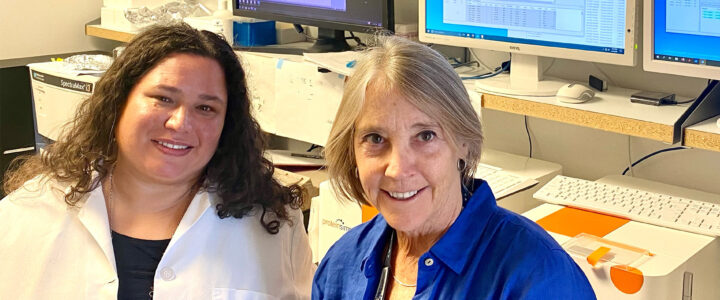FRAXA awarded a $100,000 grant to Dr. Davidson and Dr. Yrigollen at Children’s Hospital of Philadelphia to explore gene editing tools aimed at treating Fragile X syndrome by correcting FMR1 mutations in a unique mouse model.
Read moreCurative Therapies
Reactivating the FMR1 Gene to Reverse Fragile X Syndrome
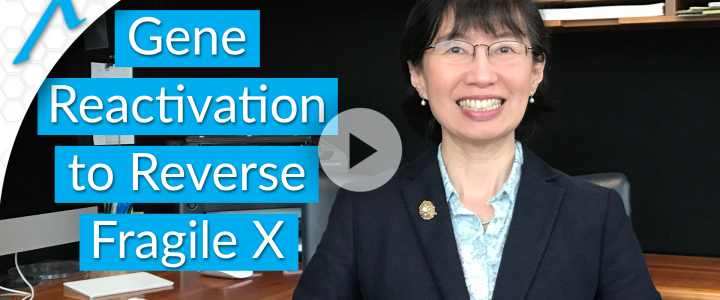
FRAXA Research Foundation is dedicated to funding breakthrough research, providing $240,000 to reactivate the FMR1 gene to combat Fragile X Syndrome, with the goal of restoring vital protein function and advancing towards a cure.
Read moreAntisense Oligonucleotides (ASOs) to restore FMRP in Human Fragile X Cerebral Organoids

Explore Dr. Richter’s encouraging results with ASOs for Fragile X syndrome. A $100,000 grant now fuels pivotal studies needed to advance toward ASO therapy.
Read moreA Tat-Conjugate Approach to Treat Fragile X Syndrome

Explore Turner Lab’s novel approach to developing definitive treatment for Fragile X syndrome with a Tat-conjugated, truncated FMRP protein. This innovative strategy aims to restore brain circuit function and reduce abnormal behaviors linked to Fragile X by directly addressing the cause of Fragile X: a missing protein.
Read moremRNA Therapy for Fragile X Syndrome

Dr. Kathryn Whitehead, Associate Professor at Carnegie Mellon University, helped develop the revolutionary science behind the COVID-19 vaccines. With a $103,000 grant from FRAXA, her team will now adapt this technology to deliver the missing Fragile X protein, to treat people who have Fragile X syndrome.
Read moreGenome-wide Screen for FMR1 Reactivation in Human FXS Neural Cells
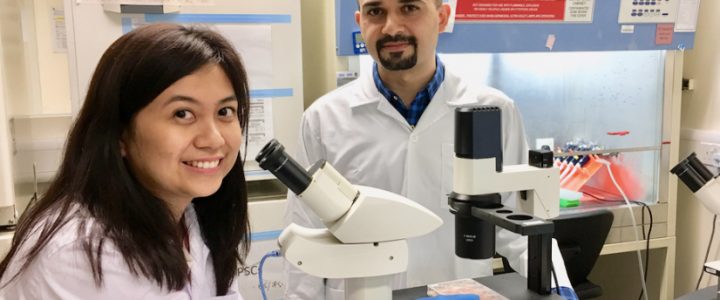
Drs. Mahmoud Pouladi and Kagistia Utami at the Agency for Science, Technology and Research (A*STAR) in Singapore were awarded a $67,500 research grant from FRAXA Research Foundation and that led to much greater governmental funding to expand this work. Their goal is to reactivate the gene which is silenced in people who have Fragile X syndrome.
Read moreGene Therapy Translational Studies for Fragile X Syndrome

With this $90,000 award from FRAXA Research Foundation, Drs. Ernest Pedapati, Christina Gross, and student Lindsay Beasley will pursue preclinical gene therapy approaches using AAV (adeno-associated virus) vectors for treating Fragile X syndrome at Cincinnati Children’s Hospital. Dr. Craig Erickson elaborates about this in this video.
Read moreReintroducing FMRP via Tat to Reduce Symptoms of Fragile X Syndrome
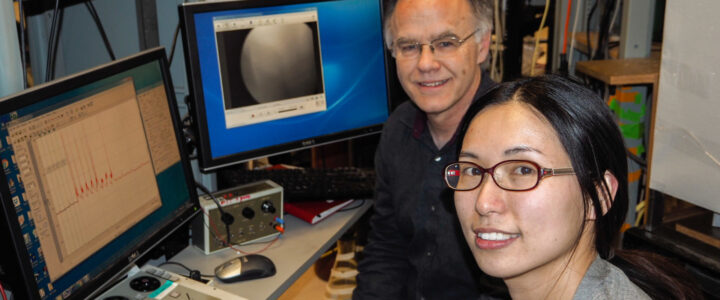
FRAXA Research Foundation and the Fragile X Research Foundation of Canada awarded a grant of $100,000 over two years to Dr. Raymond Turner at the University of Calgary in Alberta, Canada. Dr. Turner and postdoctoral fellow Xiaoqin Zhan, PhD are attempting to reactivate a segment of FMRP to reverse symptoms of Fragile X in a mouse model of the disease to reduce abnormal behaviors.
Read moreCan CRISPR Cure Fragile X Syndrome?
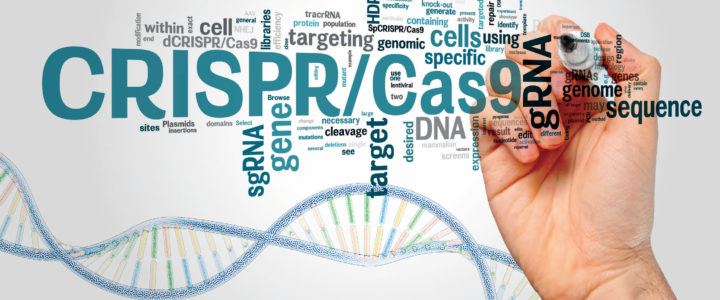
CRISPR/Cas9 was used by MIT researchers to remove the molecular tags that keep the mutant gene shut off in Fragile X syndrome neurons and resulted in some of them producing protein normally. Much work is being done right now, with exciting new discoveries coming at a fast and furious pace.
Read moreCRISPR Reactivation of the Fragile X Gene
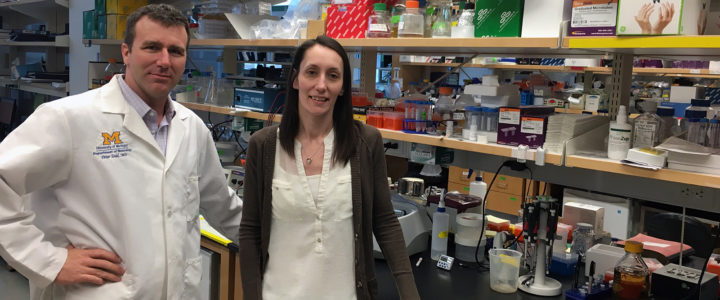
“We are trying to target the first event that goes wrong in Fragile X syndrome”, says Todd, “One reason our previous attempts to develop treatments for Fragile X syndrome have failed is that they’ve tried to target the downstream effects of losing the Fragile X protein. The protein does many things… bypassing all the functions that it normally takes care of has proven difficult from a pharmacologic perspective.”
Read moreTargeted Transcriptional Reactivation of FMR1 in Fragile X Syndrome Stem Cells

With a $90,000 grant from FRAXA Research Foundation awarded in 2016, University of Michigan researcher Peter Todd, MD, PhD, is using CRISPR to selectively turn the Fragile X gene back on in stem cells.
Read moreInvestigating Gene Reactivation to Treat Fragile X Syndrome

With a $180,000 grant from FRAXA Research Foundation from 2016-2017, Dr. Jeannie Lee and her team at Harvard are working to reactivate the gene that is silenced in Fragile X syndrome.
Read moreThe X Factor – Turning on X Chromosome Genes to Treat X-linked Disorders

Harvard researcher Jeannie T. Lee, MD, PhD, moves closer to turning on select genes on the X chromosome to treat people with X-linked disorders.
Read moreSmall Molecules To Target r(CGG) Expansions to Treat Fragile X Syndrome

With a 2-year, $90,000 grant from FRAXA Research Foundation, Dr.’s Matthew Disney and Wang-Yong Yang worked to correct the underlying problem in Fragile X: the silencing of the Fragile X gene (FMR1) and the resulting lack of FMRP (Fragile X Mental Retardation Protein). Their approach was to use novel small molecules to target the abnormal CGG repeats before the FMR1 gene.
Read moreDeveloping IPS cells to Screen Drugs which can Reactivate the FMR1 Gene

With $146,000 grant from FRAXA Research Foundation over 2012-2013, Drs. Anita Bhattacharyya and Xinyu Zhao at the University of Wisconsin developed a new mouse model of Fragile X syndrome which will enable testing of gene reactivation and gene therapy approaches to treatment. They transplanted human Fragile X neural cells differentiated from induced pluripotent stem cells into brains of neonatal mice and then testing for FMR1 reactivation. In 2015, The John Merck Fund assumed support for this work with a generous grant of $750,000 to the scientists. Results published.
Read moreReactivating the FMR1 Gene

With a $171,600 grant from FRAXA Research Foundation from 1998-2004, Dr. Andre Hoogeveen and his team at Erasmus University researched methods to reactivate the Fragile X gene.
Read moreFMR1 Gene Delivery Using Herpes Simplex Virus Vectors

With $89,000 from FRAXA Research Foundation over 2001-2005, Dr. David Bloom investigated gene therapy for Fragile X. The Bloom lab specializes in the development of gene therapy techniques, and they have succeeded in transferring the Fragile X gene (fmr1) into the brains of live mice, using viral vectors. They studied ways to enhance this process, with the ultimate goal of gene therapy for people with Fragile X.
Read moreProspects For Gene Therapy in the Fragile X
With a $90,000 grant from FRAXA Research Foundation from 2000-2002, Dr. Mario Rattazzi at the New York State Institute for Basic Research explored gene therapy: ways to transfer the FMR1 gene across the blood-brain-barrier in normal rats and mice, and then in FMR1 knockout mice. Results published.
Read moreFMR1 Gene Regulation

With a $30,000 grant from FRAXA Research Foundation in 1999, Dr. Paul Hagerman and his team at the University of California researched how to re-activate the FMR1 gene and how to measure its levels.
Read more
